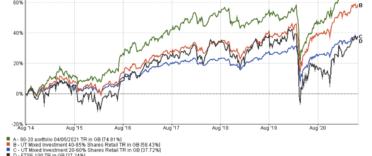Whenever the stock market hits a new all-time high investors and analysts become increasingly concerned about the increased likelihood of a correction (a 10% fall). But are these fears unfounded? How has the stock market historically behaved at previous all-time highs?
So I decided to carry out extensive research into the subject exclusively for 80-20 Investor members. Right now the US stock market remains the leading bellwether for global stocks, particularly as it continues to test new all-time highs. So for the purposes of this research I analysed every daily move in the S&P 500 since January 1950. That's over 17,500 trading days!
How markets have historical responded to new all-time highsSince January 1950 the S&P 500 has set 1,260 new all-time highs. So how has the market behaved after it has set one of these all-time highs?
Statistically, the odds that any given day on the S&P 500 will close higher than the previous day (i.e.
Full article available exclusively to 80-20 Investor members.
To read the complete article, sign up for a free trial or log in below.
Start a free trial Already have an account? Log in



